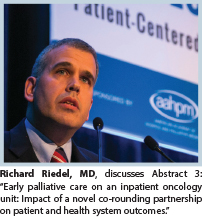The inaugural 2014 Palliative Care in Oncology Symposium was held October 24 to 25 in Boston. Over 200 abstracts were presented, covering topics such as the integration of palliative care into treatment and the financial hardships facing people living with cancer. The following abstracts were among those highlighted in the ASCO Press Program.
‘Co-rounding’ of Medical Oncologists and Palliative Care Physicians Improves Outcomes
Three daily, formal meetings between medical oncologists and palliative care specialists in a medical oncology inpatient unit were associated with significant improvements in both health system-related and patient-related outcomes.1 The study found that the 783 patients in the “co-rounding” intervention group had a significant decrease in mean length of hospital stay (4.17 days vs 4.51 days; P = .02), compared to the 731 patients admitted before the onset of the intervention. The intervention group also showed significant improvement in 7- and 30-day readmission rates (15% and 23% reduction, respectively [P = .03, P = .05]).
“To our knowledge, this is the first example where palliative care physicians and medical oncologists are working side by side every day on an inpatient oncology ward,” said lead study author Richard Riedel, MD, an Associate Professor of Medicine and Medical Director at Duke University Medical Center.
‘Smart Technology’ System Improves Symptoms of Hospice Patients and Caregivers
Early findings from a study of 319 families suggest that the use of a telephone-based system that monitors symptoms and provides health coaching to caregivers leads to decreased symptoms among patients and their caregivers in the final weeks of life.2 The symptom care intervention allowed family caregivers to call into the automated system to report on the presence and severity of patient symptoms and the severity of their own distress and symptoms. The automated system then provided customized, real-time coaching, such as how to improve the patient’s breathing. Preliminary analyses indicated that the family caregivers’ combined symptoms improved more in the symptom care group (P = .003, mixed effects model), as did patient symptoms (P = .003).
Financial and Work-Related Hardships Among U.S. Cancer Survivors
Twenty-seven percent of cancer survivors have at least one financial problem, such as debt or bankruptcy, and 37% have to modify work plans—for example, switching to a less-demanding job—due to a cancer diagnosis, according to a study out of the University of California, Davis.3 The research explored disparities in financial burden among a large, nationally representative group of 1,592 cancer survivors. Women, younger survivors, racial and ethnic minorities, and uninsured survivors were disproportionately burdened.
Insured Patients Alter Lifestyle, Medical Care to Cope With Cost of Cancer Treatment
A small nationwide survey of 174 patients found that some insured patients are changing their lifestyle and medical care to cope with cancer treatment costs—with some modifications potentially jeopardizing their medical care.4 The study found that 89% of survey participants used at least one lifestyle-altering strategy, such as spending less on basics like food and clothing (57%), and 39% used at least one medical care-altering strategy, such as not filling a prescription (28%). Younger age, higher education, and shorter time on chemotherapy were associated with greater likelihood of adopting lifestyle-coping strategies. ■
References
1. Riedel RF, Slusser K, Power S, et al: Early palliative care on an inpatient oncology unit: Impact of a novel co-rounding partnership on patient and health system outcomes. 2014 Palliative Care in Oncology Symposium. Abstract 3. Presented October 25, 2014.
2. Mooney K, Berry P, Wong B, et al: Helping cancer-family caregivers with end-of-life home symptom management: Initial evaluation of an automated symptom monitoring and coaching system. 2014 Palliative Care in Oncology Symposium. Abstract 85. Presented October 24, 2014.
3. Whitney RL, Bell J, Reed S, et al: Work and financial disparities among adult cancer survivors in the United States. 2014 Palliative Care in Oncology Symposium. Abstract 238.
4. Nipp RD, Zullig LL, Samsa G, et al: Coping with cancer treatment-related financial burden. 2014 Palliative Care in Oncology Symposium. Abstract 161.
Originally printed in ASCO Connection. © American Society of Clinical Oncology. Highlights from the 2014 Palliative Care in Oncology Symposium. ASCO Connection, January 2015: 29. All rights reserved.


